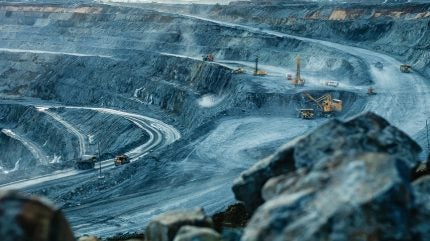
The Government of Namibia has reported that only 42% of its approved mining projects are in operation. Namibia approved 162 licences for new mines last year; however, only 68 of them are currently operational. This has forced the government to reassess how it issues mining permits.
Rich in raw material deposits, Namibia is the third-largest producer of uranium in the world, achieving an output of 6,381 tonnes in 2023, according to GlobalData. The country is also host to deposits of lithium, dysprosium and terbium – all materials used in renewable energy technologies.
Mines and Energy Minister Tom Alweendo said at a conference in Windhoek on Wednesday (7 August): “We have become more stringent when considering mining licence applications. Henceforth, the terms and conditions of all new mining licences shall be captured in a Mining Agreement… negotiated between the Ministry and the holder of the licence.”
He added that many of the current licences have been awarded to applicants lacking the necessary capabilities carry out their exploration commitments.
The Government of Namibia will now only issue mining permits to companies that meet minimum work programme requirements and have adequate financial and technical capabilities.
The mining sector accounts for about two-thirds of the Namibia’s annual goods exports and contributed more than $163m (N$3bn) to the treasury in the 2022/23 financial year, according to government figures.
Speaking during the April budget, minister Alweendo noted that Namibia has seen “an increasing inflow of investment in exploration and mining activities… on the account of an increase in both demand and prices for commodities such as uranium, gold and lithium.” He also highlighted how several mine licence holders were preparing projects to enter the construction phase.
In June 2023, Namibia introduced a ban on exports of unprocessed critical minerals. In his statement Alweendo described this as “a step in the right direction” if Namibia were to industrialise on the back of its natural resources. “We continue to improve our systems and processes in ensuring that we obtain the intended results,” he said.
However, the move could potentially deter investors, according to analysts.
“Namibia has a generally stable political and policy environment, which is expected to lead to significant growth in investment in mining in the coming years,” Dave Kurtz, director of research and analysis for mining at GlobalData previously told Mining Technology. However, he warned that the need to invest in processing facilities will require “substantial additional spend that… may put off investment in minerals such as lithium, cobalt, manganese, graphite and rare earths”.
The Fraser Institute’s mining survey, released in May, put Namibia’s overall investment attractiveness at 56 in 2023, down from 59 in 2022. The report, which ranks 86 jurisdictions based on their geologic attractiveness for minerals and metals and government policies, found that the US (Utah and Nevada), Canada (Saskatchewan and Quebec) and Western Australia among the top five jurisdictions. The least-attractive jurisdiction for mining investment is Niger, according to the survey.



